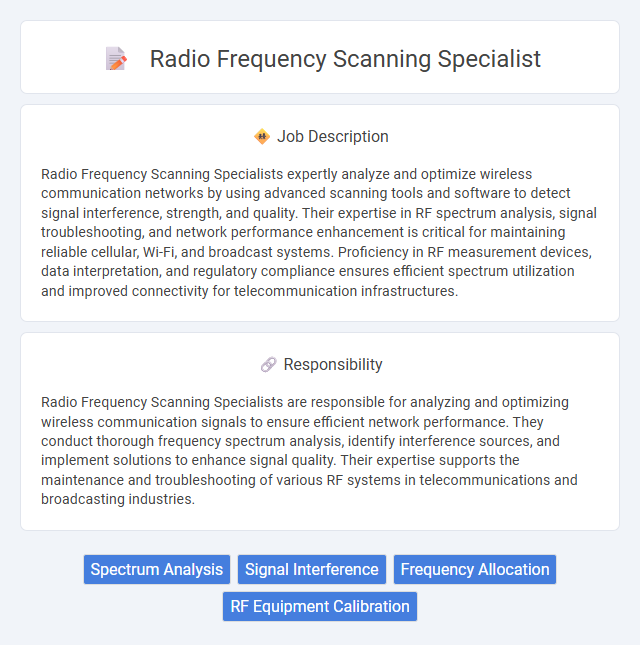
Radio Frequency Scanning Specialists expertly analyze and optimize wireless communication networks by using advanced scanning tools and software to detect signal interference, strength, and quality. Their expertise in RF spectrum analysis, signal troubleshooting, and network performance enhancement is critical for maintaining reliable cellular, Wi-Fi, and broadcast systems. Proficiency in RF measurement devices, data interpretation, and regulatory compliance ensures efficient spectrum utilization and improved connectivity for telecommunication infrastructures.
Individuals with strong attention to detail and problem-solving skills are likely to find a Radio Frequency Scanning Specialist role suitable. Those who can comfortably work in fast-paced environments and adapt to technological advancements may perform well in this position. However, people struggling with complex technical tasks or preferring minimal interaction with digital systems might find this job less fitting.
Qualification
A Radio Frequency Scanning Specialist must possess in-depth knowledge of RF technology, spectrum analysis, and signal detection techniques. Proficiency with RF scanning equipment, software tools, and troubleshooting methodologies is essential for accurate frequency identification and interference mitigation. Certification in RF engineering or related fields and hands-on experience with wireless communication systems significantly enhance job performance and credibility.
Responsibility
Radio Frequency Scanning Specialists are responsible for analyzing and optimizing wireless communication signals to ensure efficient network performance. They conduct thorough frequency spectrum analysis, identify interference sources, and implement solutions to enhance signal quality. Their expertise supports the maintenance and troubleshooting of various RF systems in telecommunications and broadcasting industries.
Benefit
Radio Frequency Scanning Specialists probably enhance network efficiency by identifying signal interference and optimizing frequency usage. They likely contribute to improved communication reliability and reduced downtime for wireless systems. Their expertise may result in cost savings and better overall performance for telecommunications infrastructure.
Challenge
The role of a Radio Frequency Scanning Specialist likely involves navigating complex signal environments that challenge even advanced technological tools. Issues such as signal interference, rapidly evolving frequency bands, and the necessity for precise data interpretation may frequently test problem-solving skills and technical knowledge. Specialists in this field probably encounter constant demands to adapt and innovate to maintain scanning accuracy and reliability in dynamic conditions.
Career Advancement
A Radio Frequency Scanning Specialist advances their career by mastering cutting-edge RF scanning technologies and developing expertise in spectrum analysis, signal detection, and interference troubleshooting. Gaining certifications such as Certified Radio Frequency (RF) Engineer or Wireless Communication Professional enhances credibility and opens doors to higher-level roles in telecommunication companies or defense sectors. Progression often leads to positions in network design, RF optimization, or project management within the wireless communications industry.
Key Terms
Spectrum Analysis
A Radio Frequency Scanning Specialist focuses on spectrum analysis to identify and troubleshoot frequency interference and optimize signal quality within designated communication bands. Utilizing advanced spectrum analyzers, they monitor radio frequency environments to detect unauthorized transmissions, signal distortions, and spectrum congestion. Expertise in RF signal characterization and modulation techniques ensures effective management of wireless networks and compliance with regulatory standards.
Signal Interference
A Radio Frequency Scanning Specialist monitors and analyzes wireless signals to detect and mitigate signal interference that can disrupt communication systems. They use advanced technology and spectrum analyzers to identify sources of electromagnetic interference, ensuring optimal signal clarity and network performance. Expertise in signal propagation and regulatory standards is essential for maintaining efficient radio frequency environments.
Frequency Allocation
Radio Frequency Scanning Specialists expertly manage frequency allocation to optimize wireless communication and prevent signal interference. They utilize advanced scanning technologies to identify available frequency bands and ensure compliance with national and international regulations. Their precise allocation strategies support efficient spectrum use in telecommunications, broadcasting, and public safety operations.
RF Equipment Calibration
Radio Frequency Scanning Specialists perform precise RF equipment calibration to ensure accurate signal detection and measurement across various frequency ranges. They utilize advanced tools such as spectrum analyzers and signal generators to adjust and verify the performance of scanning devices, maintaining compliance with industry standards. Expertise in troubleshooting calibration discrepancies and documenting calibration results is critical for optimizing RF scanning accuracy and reliability.
 kuljobs.com
kuljobs.com